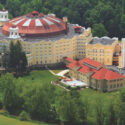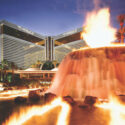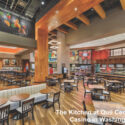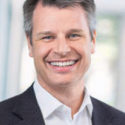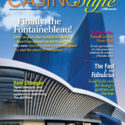Downstream Casino Resort
West of Joplin, Missouri
OWNER/OPERATOR: Quapaw Tribe of Oklahoma, through the Downstream Casino Authority.
DESIGNER: JCJ Architects, Inc. of New York
PROJECT MANAGER: Mickey Brown, G. Michael Brown & Associates of Sea Girt, N.J.
GENERAL CONTRACTOR: Manhattan Construction Co. of Tulsa
This year, the Quapaw Tribe of Oklahoma will open phase one of a luxurious, $301 million Las Vegas-style casino resort where the state lines of Oklahoma, Missouri and Kansas intersect, just west of Joplin.
Downstream Casino Resort, with 1 million square feet of building space, will feature a 70,000-square-foot gaming floor, more than 2,000 slot machines, 30 table games including blackjack, three-card poker, ultimate Texas hold-em, and mini bac, a 14-table poker room, and a race book that simulcasts in the casino’s Sports Bar.
Dining options will include a steakhouse, an upscale international buffet, and several 24-hour restaurants with a Native American theme.
At the hotel, guests can choose from 222 upscale rooms and 15 deluxe suites. There’s a penthouse-level VIP lounge, and a conference center with six meeting rooms, a boardroom, and catering services. A spa will open later this year with an oversized swimming pool, fitness center and enormous sun deck with Jacuzzi and fire pit.
Adding to the resort’s appeal: a 36-hole championship golf course, less than a mile from the hotel.
Downstream Casino Resort is “the fruition of a long-term desire for the tribe, and an economic dream come true for the region,” providing an estimated $43 million in payroll and benefits, says Sean Harrison, spokesman for the tribe.
Adds tribal chairman John Berrey, “We want everybody to benefit from this.”
Stylistically, the resort takes a sophisticated approach with a subtle but distinct emphasis on Native American themes.
The Quapaw estimate that the 140-acre resort will draw more than two million visitors annually, who will spend a projected $30 million a year.




